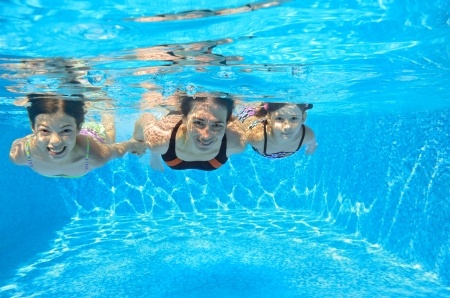Prevent Drownings & Near Drownings
September 24, 2014 | Category: Child Injuries, Swimming Accidents | ShareChildhood drownings are tragic. The Red Cross reports that over two hundred young children drown in backyard swimming pools each year.
"Near" drownings may be just as tragic. Two sisters, ages 3 and 2, were underwater for nearly 10 minutes in 2008 in Texas. Pediatric neurologists at Cook Children's Hospital, Texas, said, when interviewed in May 2014 by NBC which was updating the story, that brain cells begin to die within minutes if deprived of oxygen (hypoxia). Just five minutes underwater can result in severe brain injury.
The National Institute of Neurological Disorders and Stroke reports that the only treatment is to return oxygen to the brain as quickly as possible. Memory loss, poor judgment or decreased motor functioning are a few of the symptoms of mild hypoxia.
 Drownings and near drownings can be prevented. Pool safety is everyone's responsibility. The Florida Department of Health Injury Prevention Initiative recommends pool owners have "Layers of Protection":
Drownings and near drownings can be prevented. Pool safety is everyone's responsibility. The Florida Department of Health Injury Prevention Initiative recommends pool owners have "Layers of Protection":
Layer 1: Supervision
Drowning can be a silent catastrophe, one that can happen in the few minutes you take to answer a phone call or run inside for a towel. For children ages 1–4, the majority of drownings occur in residential swimming pools. Supervision, the first and most crucial layer of protection, means someone is always actively watching when a child is in the pool.
Layer 2: Barriers
A child should never be able to enter the pool area unaccompanied by a guardian. Barriers physically block a child from the pool. Barriers include: child-proof locks on all doors, a pool fence with self-latching and self-closing gates, as well as door and pool alarms. Pool covers may also be used but make sure it is a professional cover, fitted for your pool. A simple canvas covering can be a drowning hazard and entrap a child in the water.
Layer 3: Emergency Preparedness
The Residential Swimming Pool Safety Act (Chapter 515, Florida Statutes) requires one of the following pool safety measures for pools built after October 1, 2000 requires:
- A pool fence with self-closing, self-latching gate — enclosing the pool and providing no direct access to it.
- An approved pool cover.
- Alarms on all doors and windows leading out to the pool.
- All doors providing direct access from the home to pool to have a self-closing, self-latching device with a release mechanism no lower than 54 inches above the floor.
"The U.S. Consumer Product Safety Commission provides a very helpful, concise booklet for consumers called: Safety Barrier Guidelines for Residential Pools. As a Child Injury Attorney, I recommend everyone with a pool, or spa, have this booklet. Click on the title above to download a copy," says Attorney Randall Spivey of Spivey Law Firm, Personal Injury Attorneys, P.A.
In addition to the above "Layers of Protection":
Safety Rules: Safety rules should be established and enforced according to PoolSafety.gov:
- Keep children away from pool drains, pipes and other openings to avoid entrapments.
- No running, no diving, no riding toys poolside, no electrical appliances near the pool.
- Make sure there is a charged phone close by at all times when using the pool. Parents will not have to leave children unattended to answer the phone. And if you need to call Emergency Services, your phone is within seconds reach. Keep a list of emergency numbers poolside.
- Share safety instructions with family, friends and neighbors.
Swimming Lessons: Children should be enrolled in swimming lessons at an early age. The Association of Pool and Spa Professionals say that the risk of drowning is decreased by nearly 90 percent when children ages one to four participate in formal swimming lessons.
Florida Child Injuries Attorney, Randall L. Spivey is a Board Certified Civil Trial Attorney – the highest recognition for competence bestowed by the Florida Bar and a distinction earned by just 1 percent of Florida attorneys. He has handled over 2,000 personal injury and wrongful death cases throughout Florida. For a free and confidential consultation to discuss your legal rights, contact the Spivey Law Firm, Personal Injury Attorneys, P.A., in Lee County at 239. 337.7483 or toll free at 1.888.477.4839, or by email to Randall@SpiveyLaw.com. Visit SpiveyLaw.com for more information. You can contact Spivey Law Firm, Personal Injury Attorneys, P.A. in Charlotte County at 941.764.7748 and in Collier County 239.793.7748.

